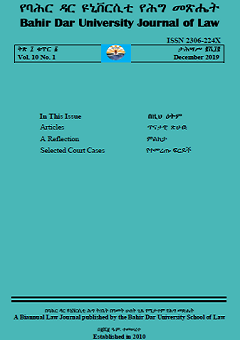Analysis of ICSID Arbitration from the Perceptive of Developing Countries: A Bittersweet Choice
Abstract
There are growing concerns among developing countries on the arbitration proceeding of the International Center for Settlement of Investment Dispute (ICSID). The worries range from the transparency of arbitral proceedings; high arbitral costs; exclusion of national courts to the unsatisfactory nature of annulment proceedings. Investors' mounting claims against developing state, the link of ICSID to the World Bank, and their lack of resources to bear costs of defending against well-resourced investors make developing states to believe that they are at a comparative disadvantage compared with developed states and their investors. Although Ethiopia is not a party to the convention, many of its Bilateral Investment Treaties (BITs) accept ICSID jurisdiction. Thus, the main purpose of this paper is to examine the cost and benefit of ICSID in the context of developing countries. Besides, relevant BITs of Ethiopia that recognize jurisdiction of the Center are analyzed to explore the potential consequences in the event that it ratifies the ICSID. Relying on the doctrinal research methodology, the article examined the ICSID convention, scholarly research findings and the literature in the field. After due analysis, the author concluded that introducing the appellate system, ensuring transparency of the arbitration process and the publication of awards would address the concerns of developing countries. The article also argues that many of Ethiopia's BITs are inconsistent and vague with regards to submission to the jurisdiction of the Center, which implicates the need to have a model BIT.
